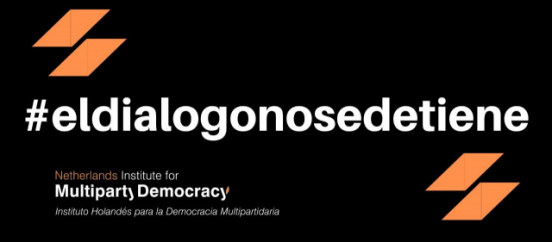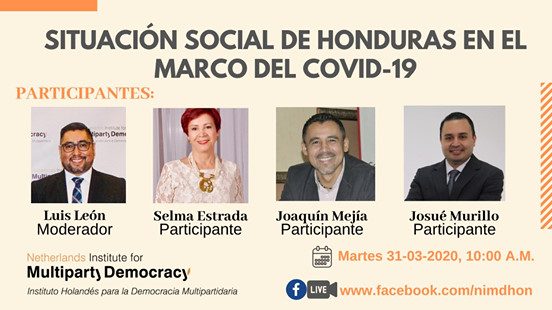
NIMD Honduras has organized a series of online debates on the long-term effects of Coronavirus on the political, economic and social landscape in Honduras.
Through these debates, NIMD hopes to inspire critical reflection among the country’s experts and politicians. Ultimately, we hope this will lead to concrete actions to lessen the impact of the virus on all aspects of life in Honduras.
As Luís Daniel León, Director of NIMD Honduras, puts it: “Dialogue leads to proposals, and proposals lead to solutions.”

The online debates will be held each Tuesday. Following the first online debate on the impact of Coronavirus on Honduran economy, NIMD explored the social impact of the outbreak on 31 March.

Debate 1: The economic impact of COVID-19
NIMD Honduras held its first debate on 24 March. Through this debate, three national economic experts addressed the effects of COVID-19 on production and the supply chain.
They discussed repercussions on companies and financial markets, but also the personal impact on the people of Honduras, including unemployment, termination of casual labour and lower family income.
The experts were:
- Economist, Ismael Zepeda
- Former Finance Minister, Rebeca Santos
- Former President of the Honduran Central Bank and former Finance Minister, Hugo Noe Pino
They were joined by almost 3000 people from across Honduras, who watched the debate on Facebook Live (either in real time or after the event), keen to hear reflections and solutions.
Posted by Ana Lopez on Tuesday, 24 March 2020
The proposals
The debate led to a series of proposals, designed to aid decision-making and draw attention to the potential economic crisis that could result from the pandemic in Honduras:
- The National Budget should be revised, with a focus on strengthening social services such as health, education, job creation, and small and medium-sized enterprises.
- It is essential to guarantee continued employment, so that Honduran families have an income while the country copes with the pandemic.
- The country’s poorest families should have access to concrete support and economic resources (in cash) to help them through isolation.
- Access to credit must be revised, especially for the production sector, to guarantee easy access and remove barriers.
- The Central Bank of Honduras should put in place extraordinary financing measures for immediate investment decisions.
- A planning process should be set out for the country. This should outline the roadmap for economic recovery in the short-, medium- and long-term.
- It is essential to stop current privatization processes.
- The necessary policies must be put in place to make sure healthcare reaches those most in need.
- It is essential to ensure food security through high investment in Honduras’s agricultural sector.
Debate 2: The social impact of COVID-19
The second debate brought together prominent experts to explore the social implications of the crisis in Honduras. These experts were:
- Joaquín Mejía, Research Coordinator
- Selma Estrada, Former Minister of the National Women’s Institute
- Josué Murillo, Director of the Pan American Development Foundation
Each brought their own insights and area of expertise to the lively discussion.
SITUACIÓN SOCIAL DE HONDURAS EN EL MARCO DEL COVID-19_NIMD-DIALOGO from nimdhonduras on Vimeo.
